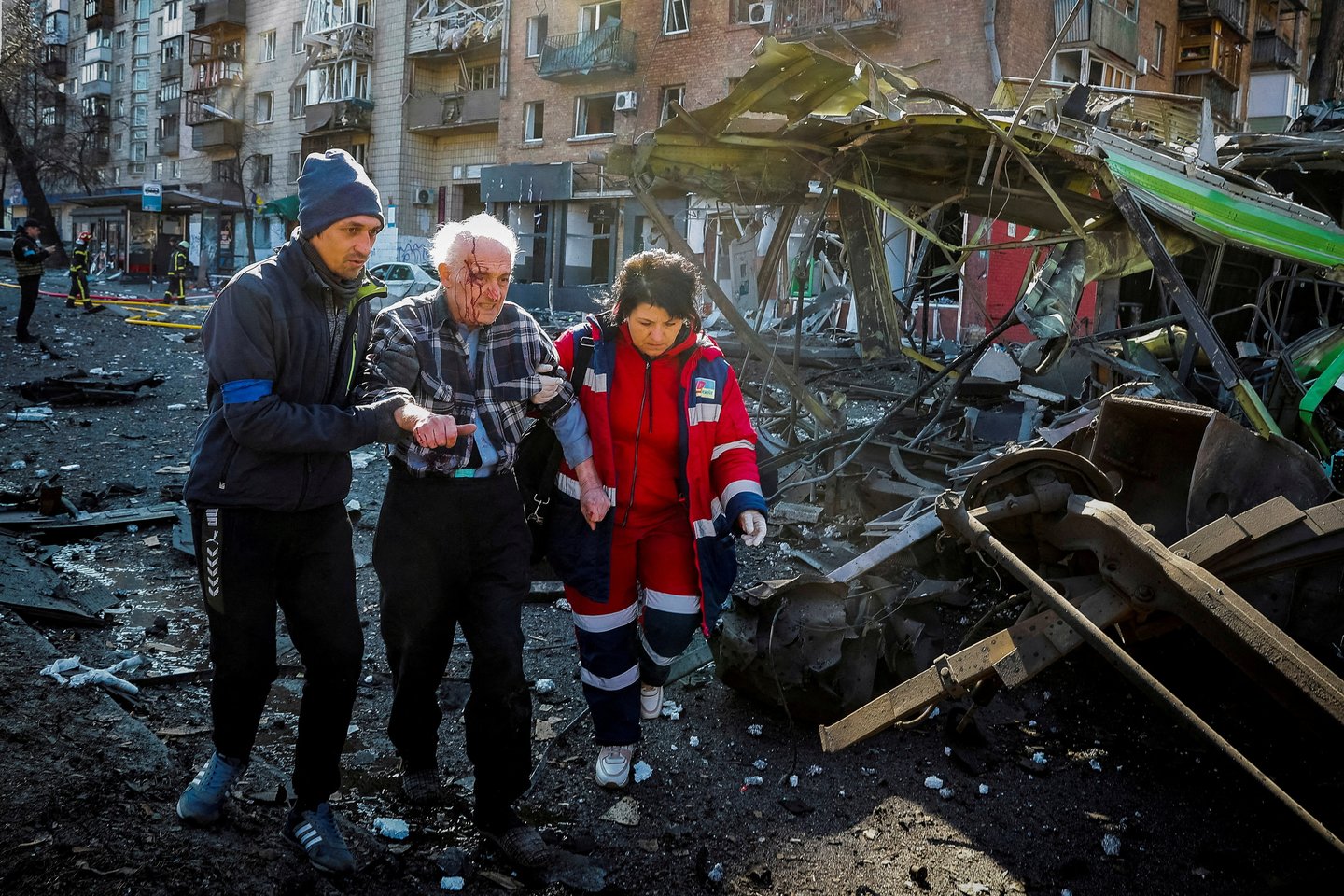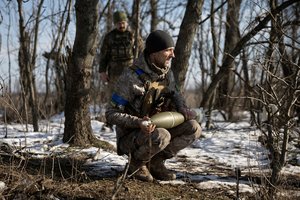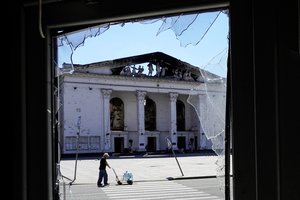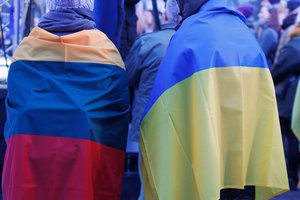Readers of lrytas.lt may remember the Ukrainian V. (real name known), who in the first days of the war both provided first-hand information about the military action in Ukraine and how ordinary Ukrainians felt at that time – and other relevant information from the perspective of the inhabitants of the invaded country.
One year after that fateful day, lrytas.lt talks to V. again – about what it was like then, what Ukrainians had to go through and what their everyday life looks like in war conditions – and what Lithuania can learn from Ukraine.
– Could you please introduce yourself?
– Hi. Let’s name me V. No, not because I overwathced James Bond movies. My person is not important, most of my acquaintances will recognize me, but I don’t think my real name is essential for others – the war sealed our lips, you know.
Let’s consider, when i say „we“, I mean „me“, „my family“ or „my acquaintances“. I am not an official, so we speak about my personal position and things I know in person only. Also please keep in mind, that all this time I’ve spent in Kyiv, a relatively safe place, especially after the defence forces kicked russians out of Kyiv, Zhytomyr and Chernihiv regions over border. So if you wait for stories about blood and guts, you will not find them here.
– Your connections with Lithuania – what are they?
– My parents and me lived in Lithuania since 1980. We returned to Ukraine in 1993, but some connections remained – friends, classmates. Connections were restored a much after Facebook gained some popularity. Some years ago me and my wife visited Lithuania (home, sweet home), our Lithuanian friends visited Ukraine. Nothing special, you know how this usually happens.
Susiję straipsniai
– You have a family. Can we know a bit about them?
– I am married, we live in Kyiv. We have two small daughters – 3 and 6 years old. Elder one entered school this year, youngest daughter goes to kindergarten.
– What do you do for the living? What is your speciality, where do you work?
– I work in the field of telecommunications in a small (although powerful!) company. My primary responsibility is infrastructure, but I work as project manager, network engineer and devops as well. Don’t be surprised, it’s OK (at least in Ukraine) if you work in this field for several decades. Moreover, it allows you to keep up with the latest trends and technologies and your brain doesn't rust (I hope so).
– Did you have any military (or paramilitary) training? Did you find it useful or do you think it would have been useful to have one?
– At one time, when I studied at the university, I graduated from the military department. I had no military experience since that time.
– Let’s get back to the February. But not the February the 24th – let’s say, a week before that. What was the mood in your social environment? Did you have a feeling for a rising storm? Or it is worth to get back some further more into the past?
– It is not right to recall February 24th, 2022 since for us the war began 8 years ago – in February 20th, 2014, when „polite green men“ annexed Crimean peninsula and occupied a part of Donbass region. Minsk treaties have turned the war into a slowly smoldering phase and it has disappeared from the first columns, but it did not end up, it just gave us some time to prepare for further. So we call February 24th, 2022 „beginning of the active phase of the war“. I think this is the right name.
If you keep this in mind, you understand, that there were no options, just a question – when russia will continue? When you heard „there will be no war“, this has to be understood like „I believe, there will be no active military operations in (for example) one week“.
It was more or less clear for me that something will happen, but I could not predict exact events and dates when and where exactly it would happen. I can not describe this feeling in colors, you just have to imagine slowly but constantly increasing mental strain covering you from all sides – news, small talks, internet. My wife tried to abstract from it, but we agreed to perform certain preparations. I am very happy she agreed that it's better to prepare and nothing will happen than it will happen and we're not ready. Of course, we hoped that the russians would rattle their weapons and withdraw their troops from the borders, as it was in previous years.
I clearly remember the feeling of certain relief when the attack did not occur on the anniversary of the attack on Crimea, as was predicted by Western intelligence, but it was just a tiny reprieve as we know now.
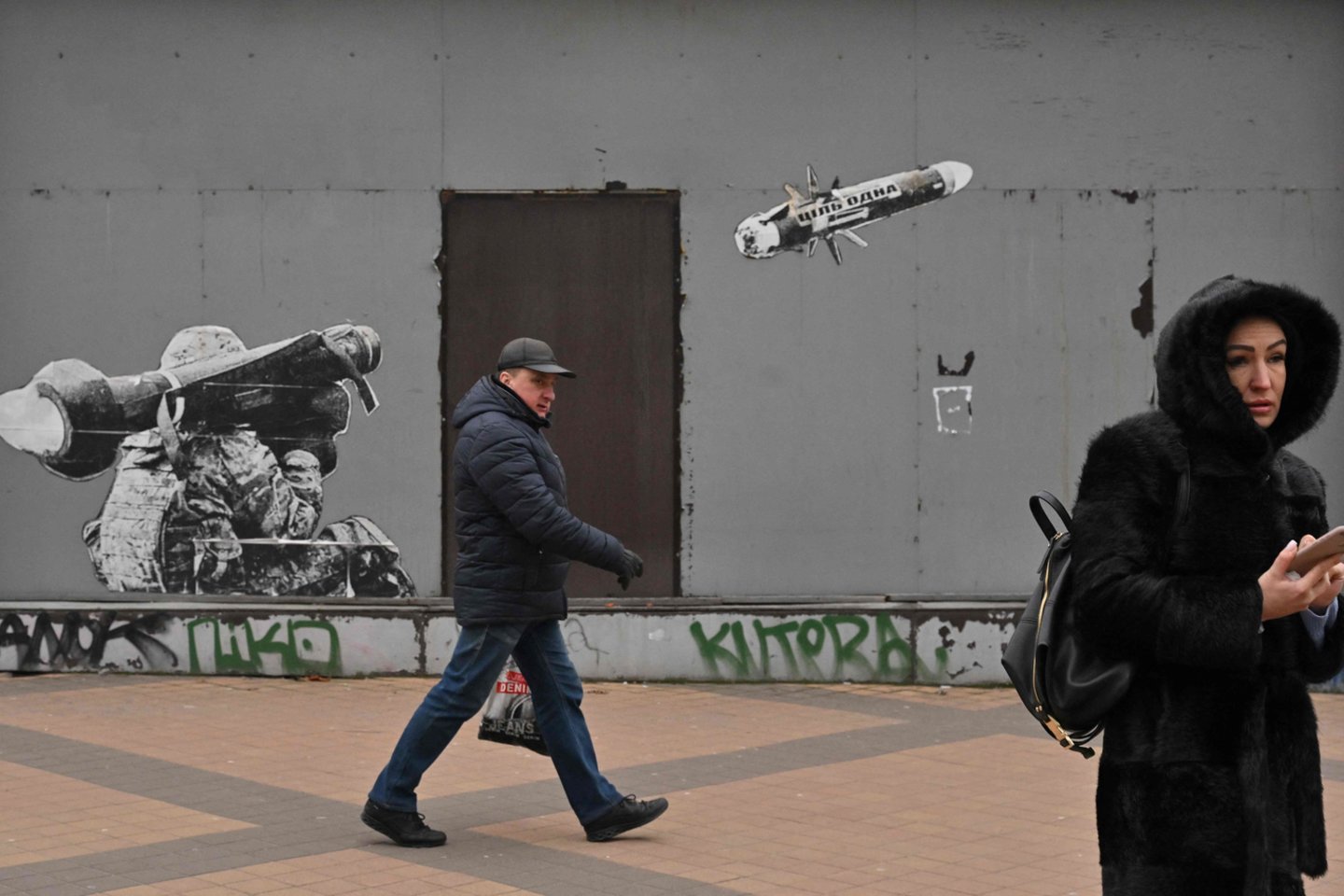
AFP / Scanpix nuotr.
– Summing it all up – were Ukrainians expecting any of that? And were you?
Many people from my social circle expected transition of the war into an active phase and prepared in one way or another. You have to understand that in terms of communication, like leads to like, so among my acquaintances, the mood was similar. Others believed the TV and believed that a full-scale war with russia was a fiction and, accordingly, did not prepare. There was no single opinion.
Speaking about my family solely, we made the next preparations. We sorted all our documents, made copies and scans of all of them and shared between me and wife. I performed the maintenance of family car and since beginning of February I drove with full tank and refuelled as often as it was possible. I added a minimal supply of food and water for several days to the car. We checked and updated medications stock, examined and treated our teeth. We checked possible ways to leave Kyiv and move to a safer places. Agreed on methods of communication if things get really bad. We made some cash reserve.
In addition I replenished my supply of ammo – purchased a bunch of slug and buckshot cartridges. Those are useless against regulars, but even inappropriate ammo is better then nothing in some cases.
In the beginning of the February my family went to visit my mother-in-law, so they met February 24st out of Kyiv. My family spent first 3 months of active phase of the war abroad, returned to Ukraine then and now they stay in one of safer western regions of Ukraine till this time, so I am more or less calm of them. I stay working in Kyiv.
After my family left Kyiv I added to the car full ration for 3 days set of dishes (bowl, mug, spoon) and winter sleeping bag. All this stock right in this composition still drives in my car.
The things I have in my backpack every day: one-time supply of underwear and socks sealed in a bag, a bottle of water, „Snickers“ and a pair packs of nuts, folding stool, first aid kit containing medications specific to me in addition to a standard set, big pack of antibacterial wipes, minimal bath set, multitool, chargeable flashlight, phone charger and powerbank with a set of charging cables and the set of copies of family documents.
You may have an idea it’s too much stock for every day, but I never know if I’ll need to move to a shelter ASAP or stay at work for a several days in a row or will I have a place to return at all.
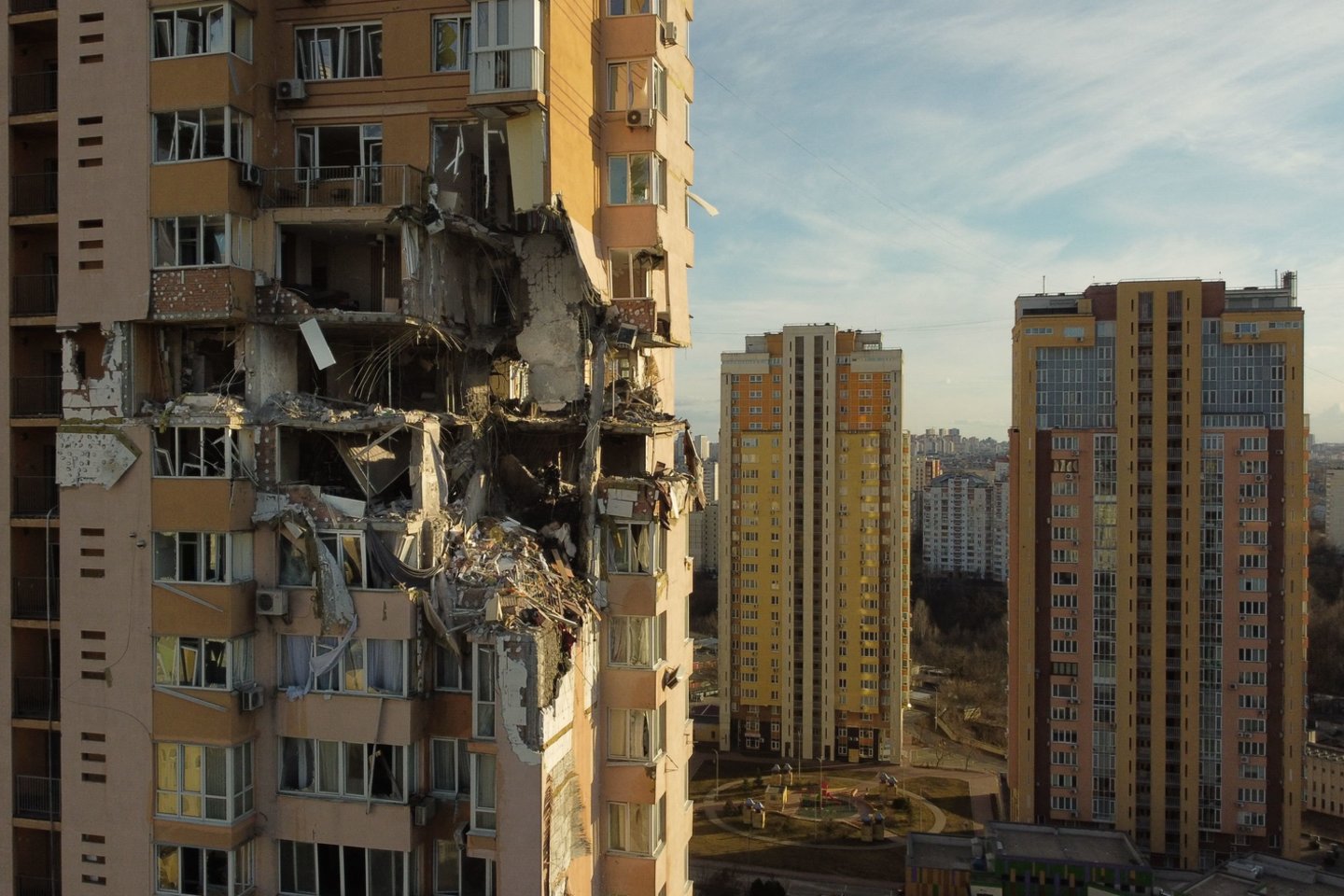
AFP / Scanpix
– February the 24th. What’s your key memory, first/essential impression on that morning and day?
– I worked at home till the late night – about 2 o’clock, don’t remember exactly. It’s was cold, so all windows were sealed. At 6 o’clock my wife’s call woke me up, she cried that war has begun and asked me if I’m OK. I opened window, heard heavy explosions afar and saw lights on the horizon to the north. I moved to the work to make sure everything works as it has to and check spares amounts.
Later we met with my colleague, he contacted our mutual friends before and they told him they stand in queue at the military checkpoint, but first of all are accepted experienced, who already fought with russians in 2014–2022 in Donbass area, so later their data were recorded for the future and they were sent to do their job.
Honestly, I do not remember the second part of the day well. I just remember that we sat at the my colleague’s kitchen, drinking tea (it’s no joke, we really drank tea), messaging with other colleagues and planning what we can do at our best. No disaster recovery procedures describes how you can run your business 24/7 during war – you have various accidents and disasters described there, but no situations when several disasters happen at the same time and you have no access to your equipment and network.
– First month of war. How did your daily routine look like? What were the main things that changed from the days before the war?
– I live at left bank of Dnipro river, the office resides at right bank, bridges across Dnipro were closed with roadblocks, crossing the bridge in one direction took 4–5 hours. So I moved to office and stayed there until first week of June leaving just for some hours in a week or two to go home for a clean clothes and home-made canned vegetables. There were three more guys like me. About a week later, one of them took his girlfriend to the office and we lived and worked like that for about 3 months. I moved sleep back at home just in the beginning of June. Now we joke it was the longest team building event we remember.
The days did not differ one from another this time: you shift for few hours, then sleep for a few hours, then work off your everyday tasks – services or links switching, hardware replacements and so every day. The only difference between the days was the change in shift and sleep time. Work day lasted about 16–18 hours because amount of tasks increased drastically due to military operations – customers cables damages, power outages, PoPs being destroyed.
After about week of military actions all telecommunication equipment sellers stocks were exhausted. To help our customers to maintain their networks up and running at least to some extent we shared our spares with them – interface modules, patchcords, other materials. After month of such operations there was left in our warehouse an irreducible remainder only. First equipment shipments arrived only in the middle of April, the situation has eased considerably since then.
On the February 26th, in local supermarket I managed to buy the last electric stove. On my next visit home I took the pot and pan, so we were able to cook normally. For the first two weeks, one or two of us went to the closest supermarket every morning just after opening and bought a supply of products – vegetables, meat, canned goods, cereals, pasta – everything to ensure a supply for several weeks of isolation for all of us.
After that we went to the store once per 3 or 4 days to buy necessary goods only. Somehow I became a selected chef, so one of my duties was to cook for our company. Usually somebody helped me to clean the vegetables, I cooked, then we took meal all together; during the meal there was time to talk and discuss the news. Then someone washed the dishes – in turn. Once per week we cleaned office. Nobody wants to live in a dump like russians do, isn’t it?
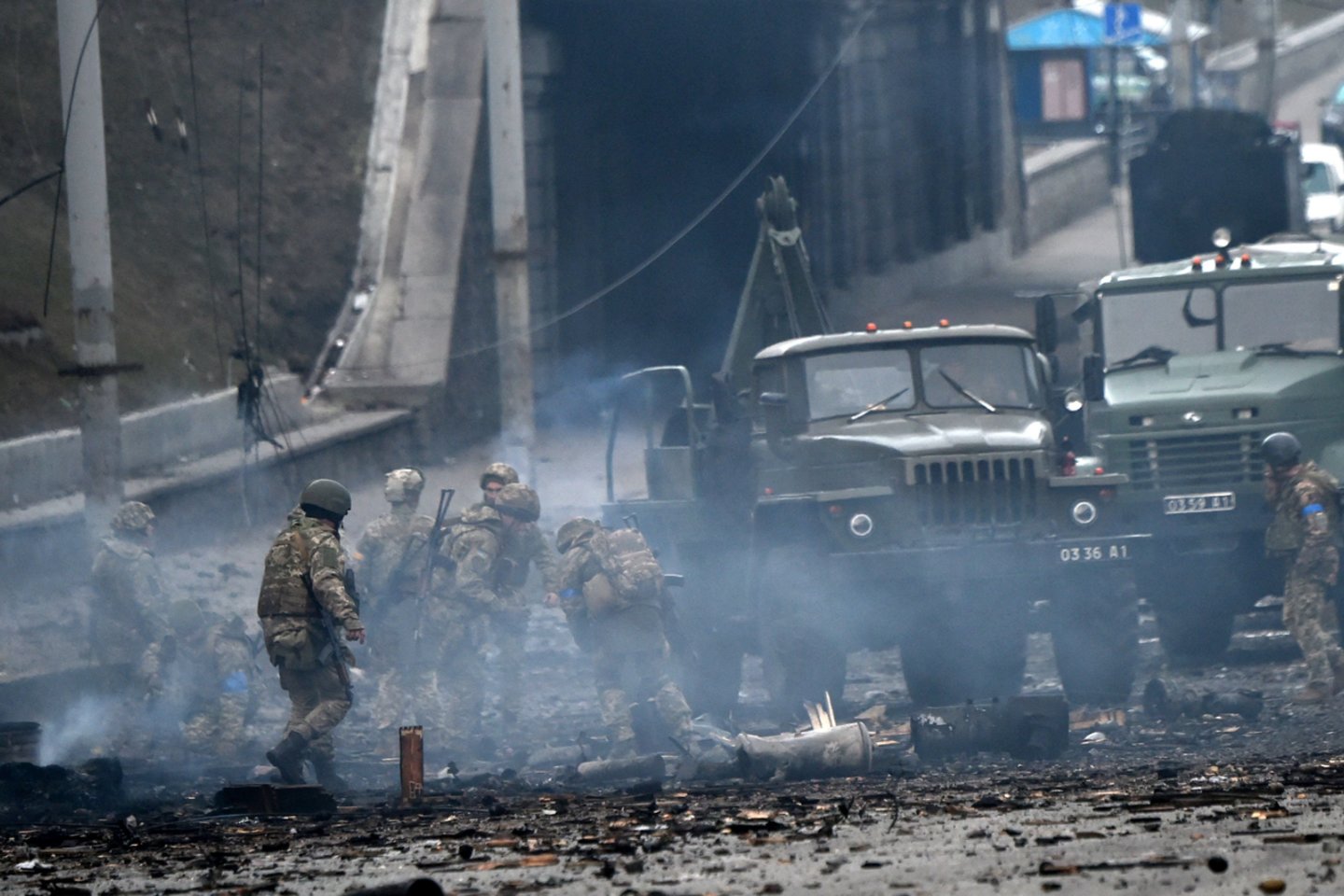
AFP / Scanpix
On February 23rd water supply in the office was refilled, so we had eighteen 20-liters bottles of drinking water. We refilled every bottle getting empty with a tap water. Once a month we checked and replaced water in unsealed bottles with fresh one. So we always had a spare containing more then 300 litres of more or less fresh drinking water.
The worst was a situation with a places to sleep – when you’re asleep, you don’t like to run somewhere else when alarm occurs, especially if you worked several full shifts in a row before. So we chose the safest place in our office building and slept there. We had only one inflatable sleeping pad, an office sofa 1,20 meters length and a plenty of bare concrete floor.
Folding beds became a wild shortage, we did not manage to get some, so we had to deal with what was available. Three months of sleeping like that gave me certain back problems, so now I limp almost all the time. It's okay, I think I'll deal with it after the victory.
I can't sleep unless the „two walls“ rule is followed now. Even at home I sleep on the floor in the corridor, although in much better conditions – after all, it's home.
I had a calls with my family twice per day – short one in the morning to ensure if family is OK and videocall in the evening.
In total, I can describe our first months like „work-eat-sleep-repeat“. And don’t forget to donate to AFU.
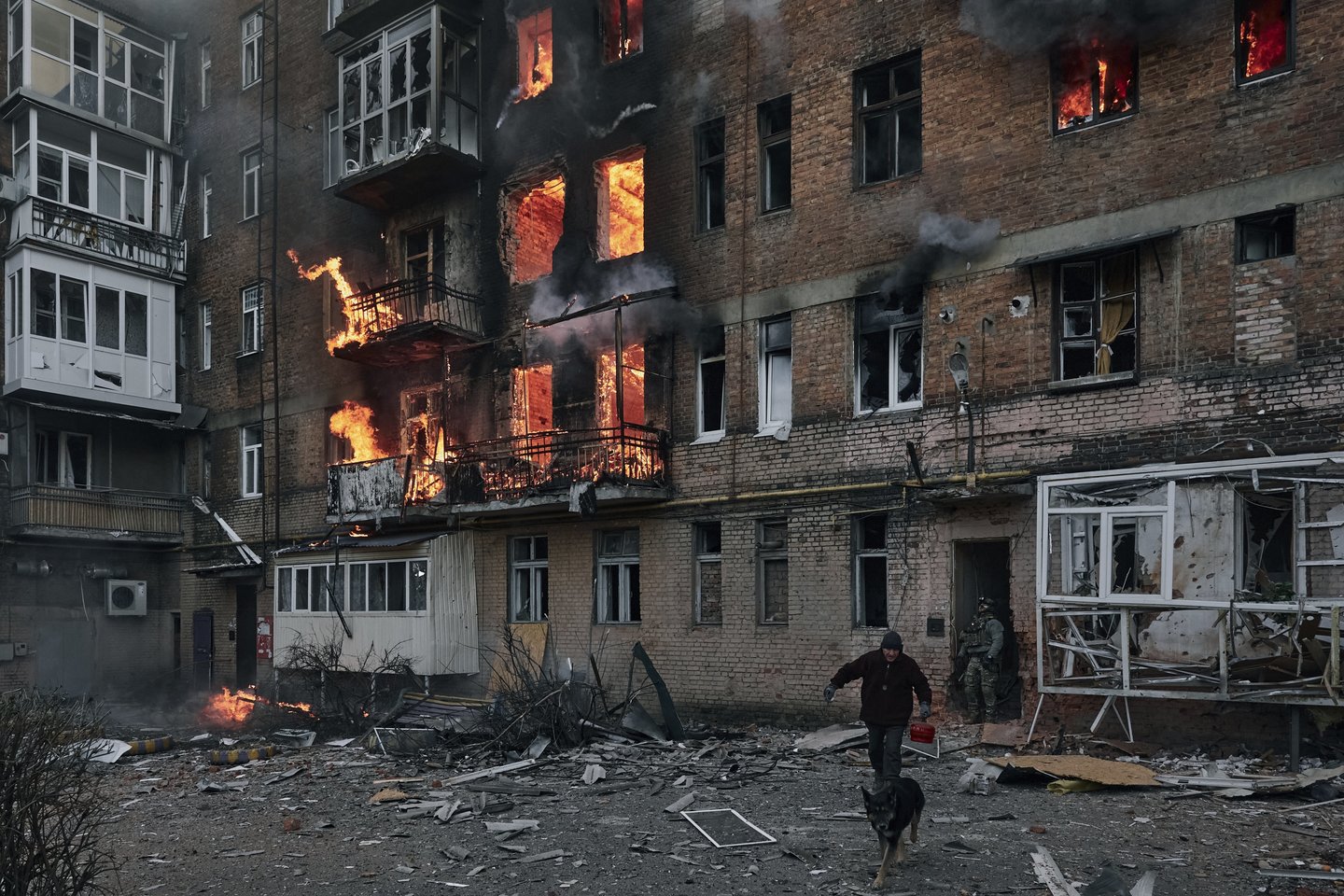
AP / Scanpix
– What does it mean to have a family during the war? How are they feeling – both about the war itself and about the father and husband staying in one of the main targets of the aggressor? What was your main reason to stay in Kyiv?
I can not describe how hard it is – I always think about them. But knowing they are safe, although far from me, makes me calm. You can deal with all your local issues if you know your family is safe.
Of course, my family wants me being together with them. They worry about me for sure. But I am very careful, eat on time, wear a hat, and I try not to disturb them too much :) „Do your duty, come what may“ became the only possible way for us now.
– For most people summer means a time for a rest, to take a break. Did arrival of summer change anything to you? Your work? Your family?
Change of season of the year changed nothing for us since the major situation is the same – the war still lasts and our best people are still killed.
In June more staff returned to Kyiv and thus I moved to sleep at home. One-way trip takes 35 to 45 minutes, I can afford it now. My work day duration slightly shortened, there are no shifts for me now, sometimes I can work from home. Once a month I can go to my family for day or two. I could not do that if they stayed abroad – this is the main reason they returned to Ukraine. My visits means very much for me and, obviously, for my girls too. As you can guess, we all had no vacations last year and probably will not have this year too. But my colleagues gave me a favor and I spent new year eve with my family.
– Comparing to the fears and expectations for the winter during first months of the war – how does it look like now?
Fortunately for us, first half of the winter passed much better I could imagine – russians failed to destroy our power grid completely and the winter still is quite warm. We have learned to live and work in conditions of constant power-offs. Hope the things will not go worse, because if they go as they are now, we’ll manage with tem.
Now (in the end of the February 2023) I see clearly, that we are passing this winter even better we could imagine and we can hope the situation will stay stable.
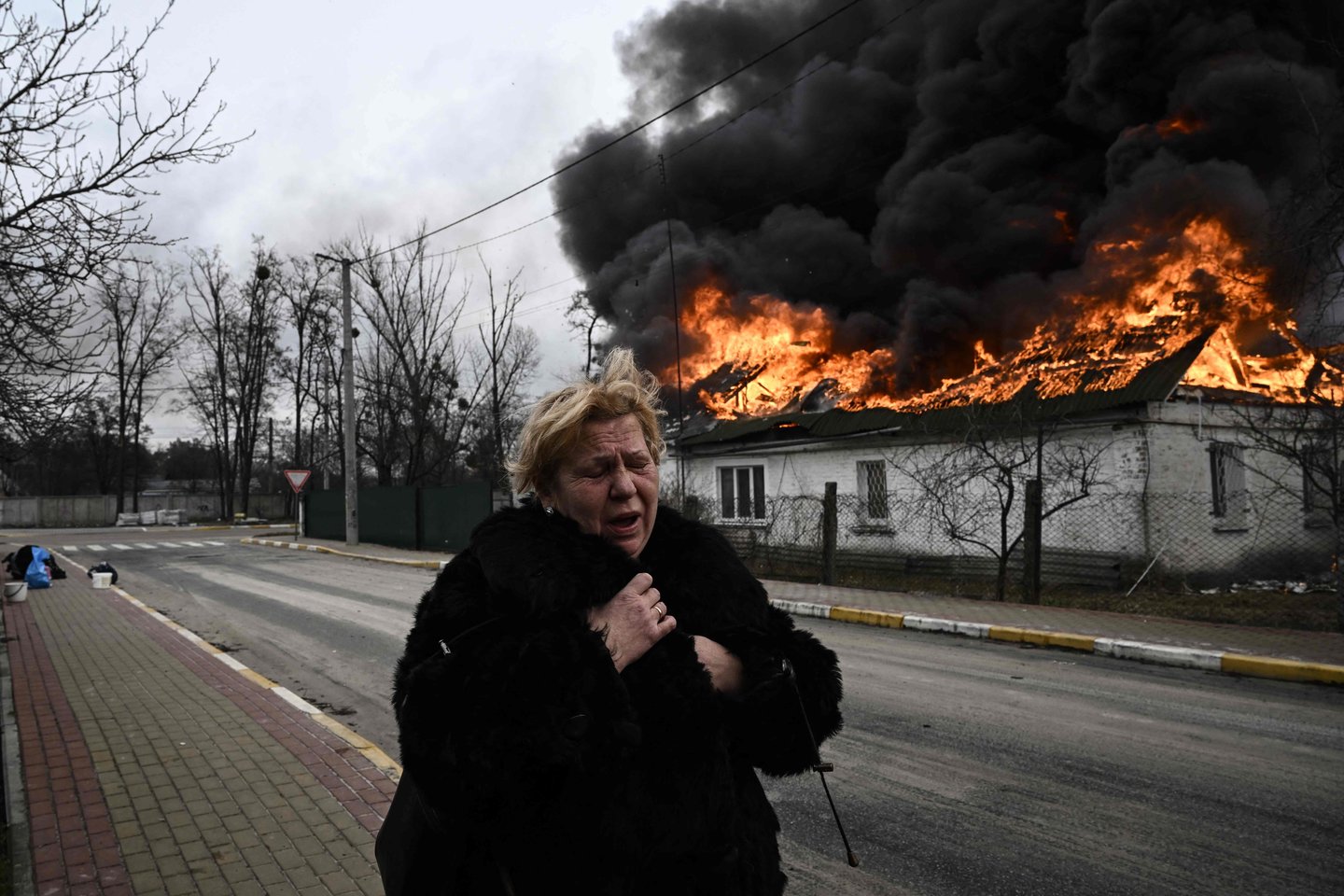
AFP / Scanpix
– Let’s get to the autumn – those first infamous shellings of infrastructure. How did it change your (and most people’s living in the city) daily life? Your professional life? We all saw photos of darkened Kyiv, but what does it really mean to live in such conditions? Any examples from everyday life?
– There were no power outages during last 10 days. But before that we had to correlate all our activities with power off schedules. And we felt happy if those schedules weree kept. If no, you were happy, that your home or office is powered for some time. This forces you to acquire new habits.
The first action you perform just after power is on – you charge all you phones, powerbanks, notebooks, flashlights – all rechargeable things. You never go out with you phone and powerbank discharged, it’s alike to go out of home being naked. You charge them everywhere you see powered charging port – at home, at work, in your car, in railcar – literally everywhere. You always remember about power saving mode feature on your devices.
This concerns your car’s fuel tank as well. You refuel just you see the level arrow slightly moved from full mark. Refueled auto means mobility. In some cases this can save your life. There are no road lights along city roads. Only major crossroads are lightened. You have to drive slow to be sure you can stop if someone would jump just in front of your car.
You have to think about laundering. It is good to pack washing machine in advance, so you just press start button. It gives you 5 to 10 spare minutes to hope your wash will end up successfully.
I live in a 22-floor building on one of the upper floors. When there is no power, there is no water supply, heating, the elevators are not working as well – the only thing you can do without power is to go to a dark toilet. But be aware – if you spill after yourself, the tank will be not filled up until the power will be not turned on again. So you need to keep certain amount of water for technical needs and replenish it constantly. There has to be supply of drinking water for a few days as well.
Also you must get rid of the habit of mechanical actions. For example you have to remember which position of the light switches is on and which is off. My wife even drew well visible marks on the switches. If you do not control this, you can wake up in a lighted room one day. It may be ok if you’re far away from frontline, but definitely not OK, if you’re close to it. Although, if you’re close to the frontline, most likely you don't have power at all. I was not in such circumstances – the longest blackout time there was no power at home was about 40 hours, although it is not the longest time I've heard about.
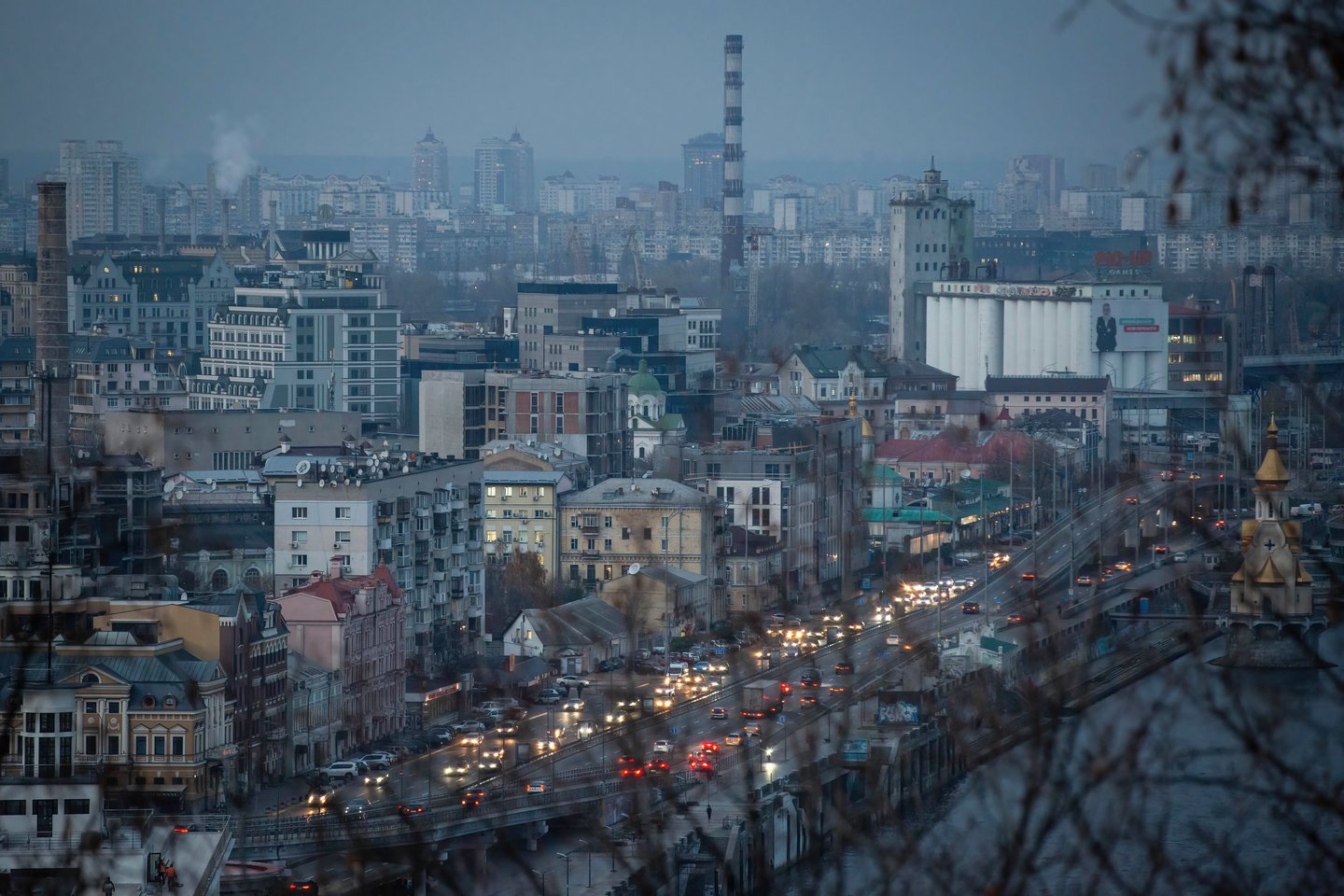
Zuma Press / Scanpix
You automatically begin to cover the windows with curtains and use only the minimal light that you need at the moment. My wife says that I have turned into a mole – I do almost everything blindly now, without turning on the light at all. It’s not as hard as you can think – just a case of habit.
You plan your moves according to a clock. You don’t want to be caught in the street during curfew. So if you’re late, you need plan where to spent the whole night until morning and I bet there will be no police station in this plan. You plan your routes to minimize movement aside possible targets. The best way goes by small streets with as low traffic as it is possible to pass them fast. This means that your moves during the rush hour should be minimized. It is better to stay at work for an hour or two and arrive in 35 minutes than to leave at rush hour and crawl three times longer.
The best transport is subway. Unfortunately, this is not an option for me, as I sometimes have to drive around the all city during the day. Kyiv is quite a big city – the distance from edge to edge in a straight line is about 40 km, so car stays the only solution.
I’ve purchased small gas stove to be able to cook even if there is no power. Single 220 ml gas cylinder provides boiling about 20 litres of water. If you have a supply of water and a gas stove – you’re a king, you have hot water and food at any time :)
Those businesses that want to work (and actually everyone wants) have installed portable generators or some other alternative power supply solution. When I walk around my neighbourhood and the power goes off, I hear internal combustion engines starting up here, there, everywhere, and after a couple of minutes this buzzing sounds from all sides. After a while you just don't pay attention to it.
You always keep a certain amount of cash – just to be sure you can buy something if there is no power. Now the situation became a bit better, as there are generators installed almost everywhere. Although, most cellular base stations still depends on batteries only. That’s why there can be no connection just in place you reside right now. Good solution is text messaging – you write a message, if it is not sent at once, it will be sent slightly later on your move.
– In your opinion – what are the most valuable lessons that Lithuania could take from those last 10 months of Ukraine? Or maybe from the longer period?
I think the best lesson was said by Bismarck: „No agreement with russians is worth the paper it is written.“ Among russians it is considered the greatest valour to cheat the one with whom they agreed, so that he could not answer. If you still have to deal with them, always keep a handgun aside. Handgun helps in such circumstances a lot. I do not mean handgun literally, but I do hope you understand what am I talking about.
Learn how to provide first aid. Attend one-day first aid courses. It is not an issue, but you’ll get a nice looking certificate. And useful knowledge of course. I had a hypertensive crisis in March. But I also had the necessary medications in my first aid kit and know how to use them – single intermuscular injection eased my condition a lot. Simple things save lives. I ensured of it.
Keep an eye on your health. Then healthier you are, then longer you live. Ill people die first, especially if they do not have access to a healthcare. And be sure, all healthcare will be used for military purposes, civilians will be served last.
Learn new technologies. At least to be able to keep your data safe when someone digs into your phone. You’ll unlock the phone by your own for sure. One suspicious picture or link – and you’re tortured or even dead. Proved by Bucha and Mariupol.
Think. Analyse. Use your brain. Trust your own eyes. Strive to be independent of other people's opinions. Remember well. TV will not tell you truth. Twitter will fake you. Facebook will cut all „wrong“ posts. Only a thoughtful, independent, your OWN analysis of events can point you in the right direction. We forgot about that and have to pay tremendous price for it.
Remember, even the least of your choice can become the main reason of your victory or defeat. Every voice is important and it can be decisive. Don’t ignore elections since otherwise your destiny will be determined by others and you will not like this. Stay brave enough to hold your destiny into your own hands. „Choose wisely“, said The Grail Knight.
Live, feel, be happy. There are so few pleasant moments, and it is impossible to return them back. So enjoy every minute of your life.
– What is your opinion on efforts of Lithuania helping Ukraine? What could Lithuania could do more or in better way?
– I do not have the right to give any assessment of the help that Lithuania provides to Ukraine – we are sincerely grateful for any help provided. The only thing I can ask – read, analyse, share. As many people as possible should learn about this unprovoked aggression and russia's crimes, about all treaties they’ve break.
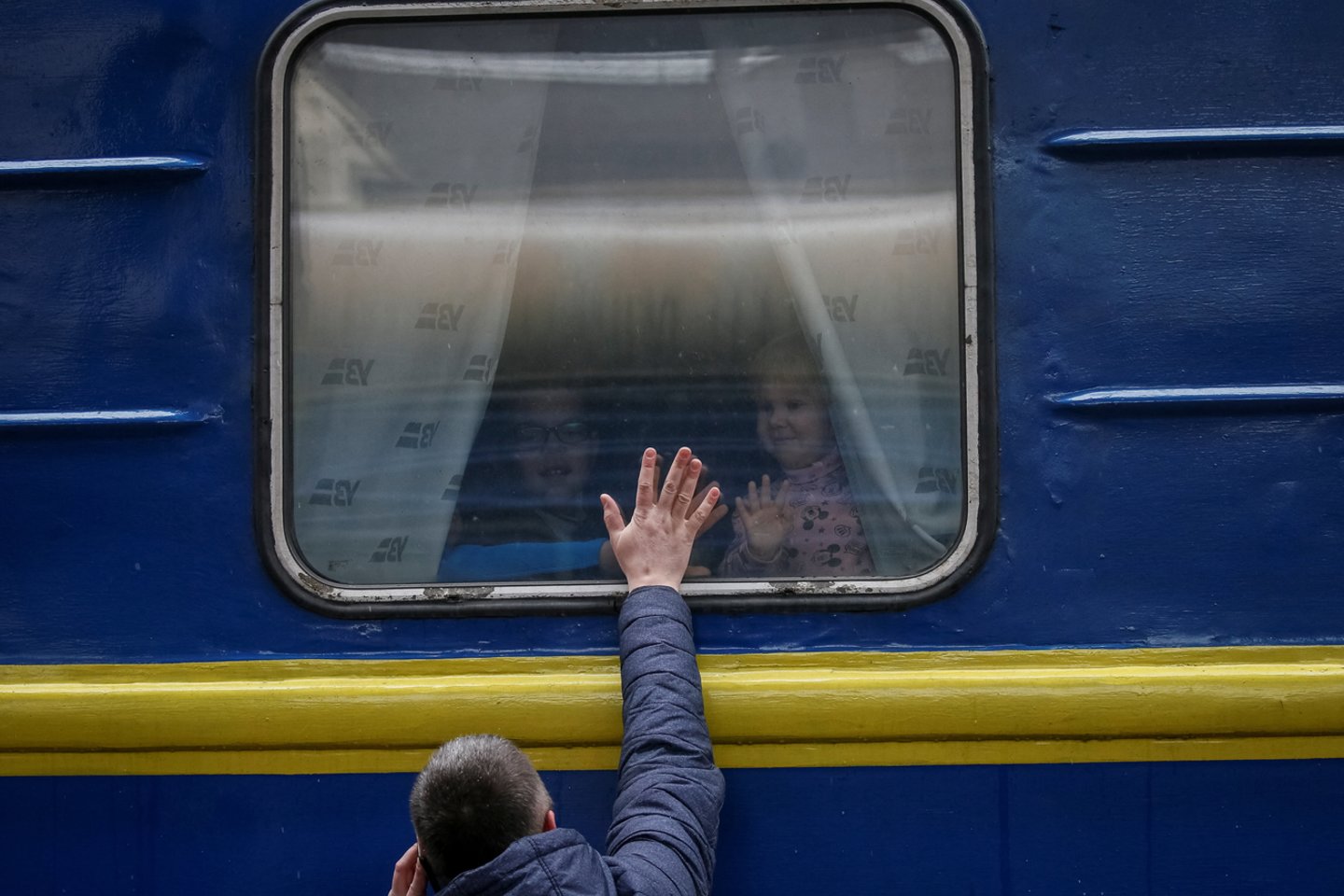
Reuters / Scanpix
– Ukrainian children and the war: how do you think it would affect current new generation? And this time let’s focus not on ones who got caught in or got caught arround the eye of the storm and felt the primary damage – but who are supposedly safe? What would next generation of Ukrainians might look and behave like?
My wife told that when she was 6, she wanted to be a dolphin trainer or a ballerina. My elder daughter wants to join territorial defence forces to protect us against russians. I’ll never forgive russians for that. They planed to „denacify“ Ukrainians. Well, they failed. They achieved the exact opposite effect – because of them will grow generation of such patriots of Ukraine that we are unlikely to be ever.
My generation still remembers the Soviet Union, the „brotherhood of nations“, other similar noodles that were hung in our ears every day. My children will not have such perverted knowledge, these distorted memories. I believe they will be better than us – smarter, stronger, kinder and, finally, happier.
– What was the most important question you (or any other Ukrainian) really wanted to be asked – but none of us did?
– May be you would like to know about our plans after the war? Unfortunately, I did not think a lot about it. This war will not end up tomorrow, many things can change till it’s end. The only thing I know for sure is just after victory I'll drive all the day to see my family ASAP.
– Question from our reader: if you could return to the first days of year 2022, how would you advise yourself to prepare for war?
Speaking about me, don’t think I would change something much. I know no warnings would change the situation before war. I would do only two things: the one is taking additional first aid trainings and the other one is acquiring nice thick travel mat. Or even two mats, two is better then one with no doubts.
– Question from our reader: in your opinion – why those Ukrainians who stayed decided not to leave the country?
It’s very unexpected question. You think Lithuanians would decide leaving Lithuania if their country would be attacked by russia? I’m sure they would not. Try to imagine the situation when you ask the Forest Brother if he would leave Lithuania – and you’ll understand our feelings and reasons.
Ukrainian Insurgent Army systematically opposed Soviet Union until 1954 (and local resistance outbreaks – until 1956), so we have very good example how to behave with russians.
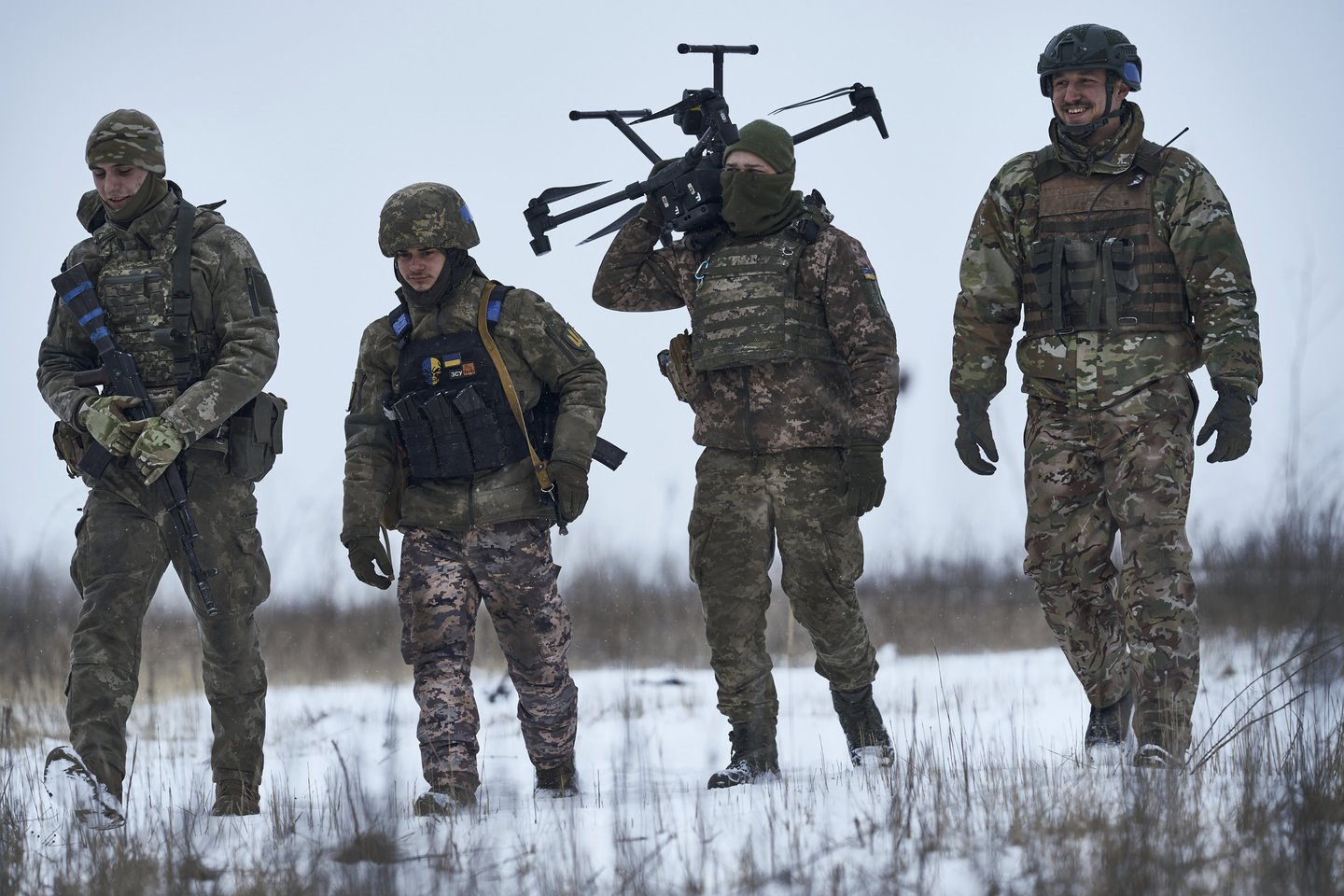
AP / Scanpix
– Question from our reader: keeping in mind all the war, are Ukrainians still interested about world wide problems, like environment protection/ecology, human rights, world famine?
We have to stay in touch with the rest of the world. This is bidirectional road. If we forget about the world abroad, how we can ask world for help? But I would lie if I would say we devote the same attention and efforts to these issues now.
As you know now, team of Ukrainian rescuers worked in Turkey for several weeks helping to save as many people as it was only possible. The same time they are really in demand at home. Could they work longer? I think so. Do we still need them at home? Yes, for sure. I know about many foreign volunteers helping there, in Ukraine, fighting with AFU, saving people at frontlines, but we know there is work we have to do by ourselves.
– Question from our reader: does a person living in such terrible circumstances return to a deeper faith (not necessarily religion)? After experiencing so much pain, after losing loved ones, would one still wish the same for the children, women, grandparents of the enemy?
– I can not say this about myself. But, there are no atheists in foxholes, you know. I believe it’s very individual and personal and no man in his right mind will speak about this in public. Regarding feelings to enemies, modern Ukrainian classic Les’ Podervyanskyi, in my opinion, very aptly formulated our main idea: „F**k off of us“. This describes my attitude towards russians very well.
You do not feel an anger or hate to a piece of sh*t, made by stray dog just in front your front door, as well you do not dream of killing the dog and all it’s relatives – you just clean this sh*t and do something to prevent it’s appearance in the future.
– Question from our reader: do you imagine a day when relationship between Ukraine and the Russia would become friendly?
– „A bullet changes a lot in the head, even if it hits the ass“, so I hope I will not see the day ever. I wish my children have very good memory and never forget Baturyn, Holodomor, executions, deportations and Sürgünlik, other russian crimes as well as their own ruined childhood. If only they try, I will remind them of it. I hope they will pass this memory on to their children so that it will be imprinted for centuries.
Russians are our neighbours, I think it will not change (I wish to, but let’s be realistic) and we will have to deal with it in the future for sure. But it does not take an affect on my attitude towards them.
– Question from our reader: how could all of us help to casual, ordinary, common Ukrainian person?
– If you mean a casual, ordinary, common Ukrainian refugee, just give him work. Social Security and Labor Ministry of Lithuania claims more than 21,000 Ukrainian refugees have found employment in Lithuania since the start of the active phase of the war till December 2022 (and they pay about 5 million euros in taxes a month). I think it is good for those people and for economy as well.
If you mean those who resides in Ukraine, I can not say – every drop of any help is valuable since different people have different needs. But I know one thing for sure: we need a plenty of weapons and ammo. We need hardware to restore our energy grid. We need hardware and materials to restore communications networks. We will need help rebuilding Ukraine after the war, but this lays in the future.
Our main task now is to defeat russia with no doubts.
